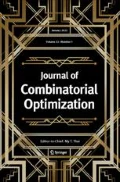Abstract
We study the following general on-line scheduling problem. Paralleljobs arrive on a parallel machine dynamically according to thedependencies between them. Each job requests a certain number ofprocessors in a specific communication configuration, but its runningtime is not known until it is completed. We present optimal on-linealgorithms for PRAMs and one-dimensional meshes, and efficientalgorithms for hypercubes and general meshes. For PRAMs we obtainoptimal tradeoffs between the competitive ratio and the largestnumber of processors requested by any job.
Our results demonstrate that on-line scheduling with dependenciesdiffers from scheduling without dependencies in several crucialaspects. First, it is essential to use virtualization, i.e., toschedule parallel jobs on fewer processors than requested. Second,the maximal number of processors requested by a job has significantinfluence on the performance. Third, the geometric structure of thenetwork topology is an even more important factor than in the absenceof dependencies.
Similar content being viewed by others
References
Sandeep N. Bhatt, Fan R.K. Chung, Jia-Wei Hong, F. Thomson Leighton, and Arnold L. Rosenberg, “Optimal Simulations by Butterfly Networks,” in Proc. of the 20th Ann. ACM Symp. on Theory of Computing,1988, pp. 192–204.
Jacek Blażewicz, Mieczyslaw Drabowski, and Jan W{ie411-01}glarz, “Scheduling multiprocessor tasks to minimize schedule length,” IEEE Trans. Comput.,vol. c?35, no.5, pp. 389–393, 1986.
Guy E. Blelloch, Vector Models for Data-Parallel Computing, MIT Press, Cambridge. MA, 1990.
Tim Brecht, Donald D. Chinn, Xiaotie Deng, and Jeff Edmonds, “On preemptively scheduling parallel jobs with changing execution characteristics,” 1996, Manuscript.
Xiaotie Deng, Nian Gu, Tim Brecht, and KaiCheng Lu, “Preemptive Scheduling of Parallel Jobs on Multiprocessors,” in Proc. of the 7th Ann. ACM-SIAM Symp.on Discrete Algorithms, 1996, pp. 159–167.
Jianzhong Du and Joseph Y.-T. Leung, “Complexity of scheduling parallel task systems,” SIAM J. Disc. Math., vol. 2, no.4, pp. 473–487, 1989.
Anja Feldmann, Ming-Yang Kao, Jiří Sgall, and Shang-Hua Teng, “Optimal Online Scheduling of Parallel Jobs with Dependencies,” in Proc. of the 25th Ann. ACM Symp. on Theory of Computing, 1993, pp. 642–651.
Anja Feldmann, Jiří Sgall, and Shang-Hua Teng, “Dynamic scheduling on parallel machines,” Theoretical Comput. Sci., vol. 130, no.1, pp. 49–72, 1994. Preliminary version appeared in Proc. of the 32nd Ann. IEEE Symp. on Foundations of Computer Sci., 1991, pp. 111–120.
Michael R. Garey and David S. Johnson, Computers and Intractability: A Guide to the Theory of NP-completeness, Freeman: San Francisco, CA, 1979.
R.L. Graham “Bounds for certain multiprocessor anomalies,” Bell System Technical J., vol. 45, pp. 1563–1581, 1966.
K. Hwang and F.A. Briggs, Computer Architecture and Parallel Processing, McGraw-Hill, 1984.
S. Rao Kosaraju and Mikhail J. Atallah “Optimal Simulation between Mesh-Connected Arrays of Processors,” in Proc. of the 18th Ann. ACM Symp. on Theory of Computing, 1986, pp. 264–272.
H.T. Kung, “Computational models for parallel computers,” Technical Report CMU-CS-88-164, Carnegie-Mellon University, 1987.
E.L. Lawler, J.K. Lenstra, A.H.G. Rinnooy Kan, and D.B. Shmoys, “Sequencing and scheduling: Algorithms and complexity,” in Handbooks in Operations Research and Management Science, Vol. 4: Logistics of Production and Inventory, S.C. Graves, A.H.G. Rinnooy Kan, and P. Zipkin (Eds.), North-Holland, 1993, pp. 445–552.
Jan Karel Lenstra and A.H.G. Rinnooy Kan, “Complexity of scheduling under precedence constraints,” Operations Research, vol. 26, pp. 22–35, 1978.
Rajeev Motwani, Steven Phillips, and Eric Torng, “Non-clairvoyant Scheduling,” in Proc. of the 4th Ann. ACMSIAM Symp. on Discrete Algorithms, 1993, pp. 422–431.
Abhiram G. Ranade, “How to Emulate Shared Memory,” in Proc. of the 28th Ann. IEEE Symp. on Foundations of Computer Sci., pp. 185–194, 1987.
Jiří Sgall, “On-line scheduling on parallel machines,” Ph.D. Thesis, Technical Report CMU-CS-94-144, Carnegie-Mellon University, Pittsburgh, PA, U.S.A., 1994.
Jiří Sgall, “Randomized on-line scheduling of parallel jobs,” J. of Algorithms, vol. 21, pp. 149–175, 1996. Preliminary version appeared in Proc. of the 3rd Israel Symp. on Theory of Computing and Systems, 1995, pp. 241–150.
Jiří: Sgall, “On-line scheduling—a survey,” submitted.
David B. Shmoys, Joel Wein, and David P. Williamson, “Scheduling Parallel Machines On-Line,” in Proc. of the 32nd Ann. IEEE Symp. on Foundations of Computer Sci., 1991, pp. 131–140.
Daniel D. Sleator and Robert E. Tarjan, “Amortized efficiency of list update and paging rules,”Commun. ACM, vol. 28, no.2, pp. 202–208, 1985.
Qingzhou Wang and Kam Hoi Cheng, “A heuristic of scheduling parallel tasks and its analysis,” SIAM J. Comput., vol. 21, no.2, pp. 281–294, 1992.
Author information
Authors and Affiliations
Rights and permissions
About this article
Cite this article
Feldmann, A., Kao, MY., Sgall, J. et al. Optimal On-Line Scheduling of Parallel Jobs with Dependencies. Journal of Combinatorial Optimization 1, 393–411 (1998). https://doi.org/10.1023/A:1009794729459
Issue Date:
DOI: https://doi.org/10.1023/A:1009794729459




